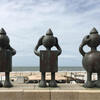Over het belang van een kritische omgeving
Integriteit en kwaliteit in de Nederlandse geschiedschrijving
DOI:
https://doi.org/10.51769/bmgn-lchr.12019Abstract
Deze bijdrage is onderdeel van het discussiedossier 'Omgang met de Tweede Wereldoorlog: integriteit en nivellering'.
In 2019 onderzocht de Commissie Wetenschappelijke Integriteit van de Rijksuniversiteit Groningen of Ad van Liempt in zijn proefschrift plagiaat had gepleegd. Zij oordeelde dat dit niet het geval was maar signaleerde wel dat er sprake was van slordigheden en omissies in de bronvermeldingen. Dit roept de vraag op waar de grenzen liggen tussen schending van de wetenschappelijke integriteit en gebrek aan zorgvuldigheid. In deze bijdrage wijs ik op het belang van een kritische omgeving bij het doen van wetenschappelijk onderzoek, en op de risico’s die de drang tot ‘scoren’ met zich meebrengen voor het bevorderen van kwaliteit en integriteit in de wetenschap.
In 2019, the Academic Integrity Committee of the University of Groningen investigated whether Ad van Liempt had committed plagiarism in his dissertation. It ruled that this was not the case, but the committee did identify sloppiness and omissions in Van Liempt’s source citations. This raises the question of where the boundaries lie between the violation of scientific integrity and the lack of due diligence. In this contribution, I point out the importance of a critical environment when conducting scientific research, and the risks that the urge to ‘score’ entails for the fostering of quality and integrity in science.
Downloads

Published
Issue
Section
License
Copyright (c) 2022 Ruud Abma

This work is licensed under a Creative Commons Attribution 4.0 International License.
Authors who publish with this journal agree to the following terms:
a) Authors retain copyright and grant the journal right of first publication with the work simultaneously licensed under a Creative Commons Attribution 4.0 International (CC BY 4.0) that allows others to share the work with an acknowledgement of the work's authorship and initial publication in this journal.
b) Authors are able to enter into separate, additional contractual arrangements for the non-exclusive distribution of the journal's published version of the work (e.g., post it to an institutional repository or publish it in a book), with an acknowledgement of its initial publication in this journal.
c) Authors are permitted to post their work online (e.g., in institutional repositories or on their website) prior to and during the submission process.
Authors are explicitly encouraged to deposit their published article in their institutional repository.








